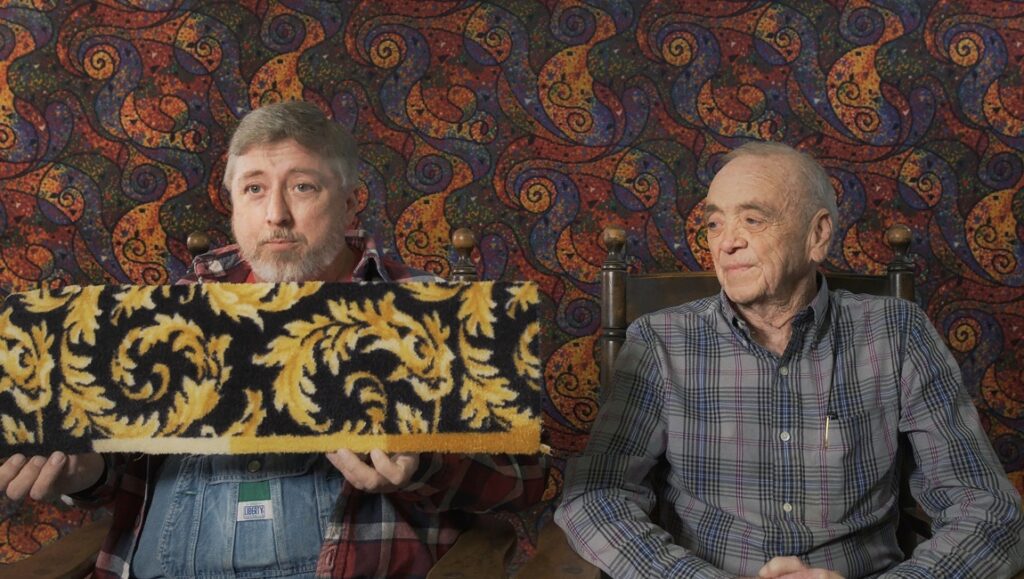There are a few different films all struggling for screen time in Noah Collier & Emily MacKenzie’s new documentary Carpet Cowboys, including a treatise on corporate consolidation, profiles of various low-key oddballs, and an investigation into the inner workings of textile manufacturing and sales. All three are related, of course, but the filmmakers gradually narrow their focus to one subject in particular, who in turn becomes a kind of symbolic stand-in for the slow death rattle of the American dream. It’s a lot, in other words. Thankfully, Collier and MacKenzie have a zippy pace and a plethora of good humor working in their film’s favor.
Carpet Cowboys begins with a few factoids about Dalton, Georgia; a town of roughly 35,000 people, it’s been dubbed “the carpet capital of the world,” producing almost 90% of the world’s carpet. The camera slowly dollies across different carpets, vibrantly elaborate patterns adorning the floors of hotels, casinos, and convention centers. A few talking heads speak about their history in Dalton; a father/son duo, Doug and Lloyd Caldwell, are featured plenty, but the real star of the movie is Scottish expat Roderick James, who came to America in 1985 and became enchanted by the mythos of the Western, crafting an “outlaw country” persona with a peculiar fashion sense (i.e. lots of scarves and American flag patches). Part hustler, part carnival barker, Roderick happily recounts his years in the business as a designer and salesman, as well as a detour into attempted music stardom and a long-distance relationship with a Filipino woman he met online. But the world has changed; opportunities have dried up as smaller, family-run firms have been bought up by larger companies, while suburban developments have irrevocably changed the landscape. The camera follows one man as he waits in line at at a McDonald’s drive-thru and details where his family home was located before the entire neighborhood was demolished and redeveloped. He notes that the parking lot they are currently in used to be his backyard. It’s a familiar tale from anywhere in these United States, rendered here on a smaller, more personal scale. Indeed, the filmmakers seem to have taken a cue from filmmaker John Wilson, an executive producer on the movie, and his penchant for following interesting people around and gently coaxing stories out of them — several critics have even suggested a similarity between Carpet Cowboys and Christopher Guest’s various mockumentaries, though the tone here is quite different, more attuned to listening than gawking. As Roderick and his business partner Jon hustle to make ends meet, the former decides to raise enough money to go back to the Philippines to be reunited with his wife and children.
This synopsis offers a very streamlined account of a somewhat unwieldy film. While the streaming services are currently obsessed with true crime docs that are often distended to ridiculous lengths, it’s refreshing to encounter this film’s tidy 85-minute runtime. But one wishes for just a little more breathing room; Doug and Lloyd are quickly relegated to the back-burner as the film spends more time with Roderick, and likewise the truly fascinating behind-the-scenes look at the manufacturing side. One sequence features a man in a laboratory explaining how they test various substances like urine and feces on carpeting, while another finds two people walking in circles over the same swath of material. It’s explained that this is a stress test, and that over the course of several weeks the carpet will be subjected to 80,000 steps — it’s all quite compelling. Less so is a tangent on Roderick and Jon trying to write a jingle about glue — clips of a young child appearing on Shark Tank to get funding for this new glue feel campy in a way the rest of the film does not. Still, despite a nagging sense of disorganization, Collier and MacKenzie wrap things up with an appropriately elegiac tone. The dreamer is vanquished, destined to tilt at windmills in a foreign land, while the inexorable march of progress continues unabated. People die, and so do towns and industries. What will they build on top of us once capitalism has flattened and buried everything?
DIRECTOR: Noah Collier & Emily MacKenzie; CAST: —; DISTRIBUTOR: Memory; IN THEATERS: August 25; RUNTIME: 1 hr. 25 min.


Comments are closed.